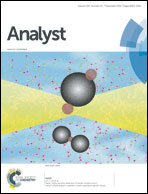eMethylsorb: rapid quantification of DNA methylation in cancer cells on screen-printed gold electrodes
Abstract
Simple, sensitive and inexpensive regional DNA methylation detection methodologies are imperative for routine patient diagnostics. Herein, we describe eMethylsorb, an electrochemical assay for quantitative detection of regional DNA methylation on a single-use and cost-effective screen-printed gold electrode (SPE-Au) platform. The eMethylsorb approach is based on the inherent differential adsorption affinity of DNA bases to gold (i.e. adenine > cytosine ≥ guanine > thymine). Through bisulfite modification and asymmetric PCR of DNA, methylated and unmethylated DNA in the sample becomes guanine-enriched and adenine-enriched respectively. Under optimized conditions, adenine-enriched unmethylated DNA (higher affinity to gold) adsorbs more onto the SPE-Au surface than methylated DNA. Higher DNA adsorption causes stronger coulombic repulsion and hinders reduction of ferricyanide [Fe(CN)6]3−ions on the SPE-Au surface to give a lower electrochemical response. Hence, the response level is directly proportional to the methylation level in the sample. The applicability of this methodology was tested by detecting the regional methylation status in a cluster of eight CpG sites within the engrailed (EN1) gene promoter of the MCF7 breast cancer cell line. A 10% methylation level sensitivity with good reproducibility (RSD = 5.8%, n = 3) was achieved rapidly in 10 min. Furthermore, eMethylsorb also has advantages over current methylation assays such as being inexpensive, rapid and does not require any electrode surface modification. We thus believe that the eMethylsorb assay could potentially be a rapid and accurate diagnostic assay for point-of-care DNA methylation analysis.


 Please wait while we load your content...
Please wait while we load your content...